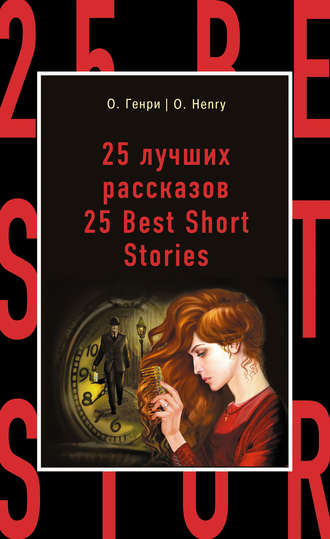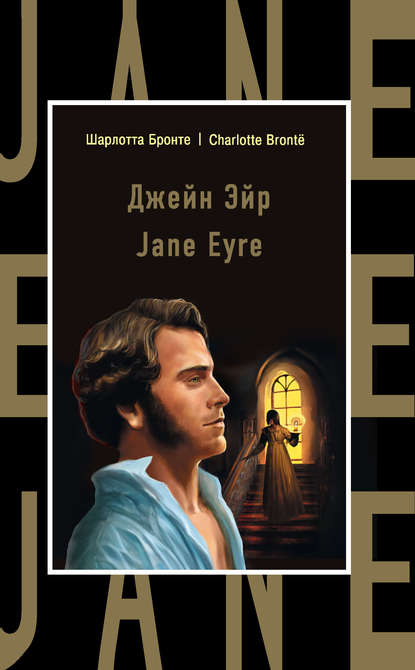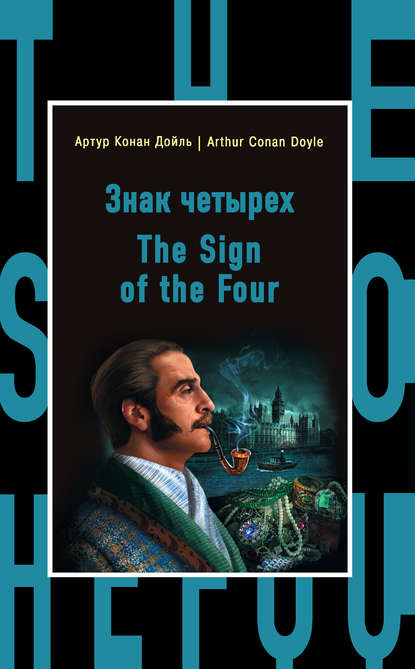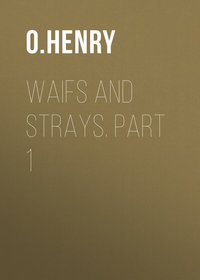
Полная версия
25 лучших рассказов / 25 Best Short Stories
“You little fool!” cried Lou, loudly and affectionately. “I see you are still working in that store, and as shabby as ever. And how about that big catch you were going to make – nothing doing yet, I suppose?”
And then Lou looked, and saw that something better than prosperity had descended upon Nancy – something that shone brighter than gems in her eyes and redder than a rose in her cheeks, and that danced like electricity anxious to be loosed from the tip of her tongue.
“Yes, I’m still in the store,” said Nancy, “but I’m going to leave it next week. I’ve made my catch – the biggest catch in the world. You won’t mind now Lou, will you? – I’m going to be married to Dan – to Dan! – he’s my Dan now – why, Lou!”
Around the corner of the park strolled one of those new-crop, smooth-faced young policemen that are making the force more endurable – at least to the eye. He saw a woman with an expensive fur coat, and diamond-ringed hands crouching down against the iron fence of the park sobbing turbulently, while a slender, plainly-dressed working girl leaned close, trying to console her. But the Gibsonian[26] cop, being of the new order, passed on, pretending not to notice, for he was wise enough to know that these matters are beyond help so far as the power he represents is concerned, though he rap the pavement with his nightstick till the sound goes up to the furthermost stars.
Vanity and Some Sables
When “Kid” Brady was sent to the rope by Molly McKeever’s blue-black eyes he withdrew from the Stovepipe Gang. So much for the power of a colleen’s blanderin’ tongue and stubborn true-heartedness. If you are a man who read this, may such an influence be sent you before 2 o’clock to-morrow; if you are a woman, may your Pomeranian[27] greet you this morning with a cold nose – a sign of dog-health and your happiness.
The Stovepipe Gang borrowed its name from a sub-district of the city called the “Stovepipe,” which is a narrow and natural extension of the familiar district known as “Hell’s Kitchen.” The “Stovepipe” strip of town runs along Eleventh and Twelfth avenues on the river, and bends a hard and sooty elbow around little, lost homeless DeWitt Clinton park. Consider that a stovepipe is an important factor in any kitchen and the situation is analyzed. The chefs in “Hell’s Kitchen” are many, and the “Stovepipe” gang, wears the cordon blue.
The members of this unchartered but widely known brotherhood appeared to pass their time on street corners arrayed like the lilies of the conservatory and busy with nail files and penknives. Thus displayed as a guarantee of good faith, they carried on an innocuous conversation in a 200-word vocabulary, to the casual observer as innocent and immaterial as that heard in clubs seven blocks to the east.
But off exhibition the “Stovepipes” were not mere street corner ornaments addicted to posing and manicuring. Their serious occupation was the separating of citizens from their coin and valuables. Preferably this was done by weird and singular tricks without noise or bloodshed; but whenever the citizen honored by their attentions refused to impoverish himself gracefully his objections came to be spread finally upon some police station blotter or hospital register.
The police held the “Stovepipe” gang in perpetual suspicion and respect. As the nightingale’s liquid note is heard in the deepest shadows, so along the “Stovepipe’s” dark and narrow confines the whistle for reserves punctures the dull ear of night. Whenever there was smoke in the “Stovepipe” the tasselled men in blue knew there was fire in “Hell’s Kitchen.”
“Kid” Brady promised Molly to be good. “Kid” was the vainest, the strongest, the wariest and the most successful plotter in the gang. Therefore, the boys were sorry to give him up.
But they witnessed his fall to a virtuous life without protest. For, in the Kitchen it is considered neither unmanly nor improper for a guy to do as his girl advises.
Black her eye for love’s sake, if you will; but it is all-to-the-good business to do a thing when she wants you to do it.
“Turn off the hydrant,” said the Kid, one night when Molly, tearful, besought him to amend his ways. “I’m going to cut out the gang. You for mine, and the simple life on the side. I’ll tell you, Moll – I’ll get work; and in a year we’ll get married. I’ll do it for you. We’ll get a flat and a flute, and a sewing machine and a rubber plant and live as honest as we can.”
“Oh, Kid,” sighed Molly, wiping the powder off his shoulder with her handkerchief, “I’d rather hear you say that than to own all of New York. And we can be happy on so little!”
The Kid looked down at his speckless cuffs and shining patent leathers with a suspicion of melancholy.
“It’ll hurt hardest in the rags department,” said he. “I’ve kind of always liked to rig out swell when I could. You know how I hate cheap things, Moll. This suit set me back sixty-five. Anything in the wearing apparel line has got to be just so, or it’s to the misfit parlors for it, for mine. If I work I won’t have so much coin to hand over to the little man with the big shears.”
“Never mind, Kid. I’ll like you just as much in a blue jumper as I would in a red automobile.”
Before the Kid had grown large enough to knock out his father he had been compelled to learn the plumber’s art. So now back to this honorable and useful profession he returned. But it was as an assistant that he engaged himself; and it is the master plumber and not the assistant, who wears diamonds as large as hailstones and looks contemptuously upon the marble colonnades of Senator Clark’s mansion.
Eight months went by as smoothly and surely as though they had “elapsed” on a theater program. The Kid worked away at his pipes and solder with no symptoms of backsliding. The Stovepipe gang continued its piracy on the high avenues, cracked policemen’s heads, held up late travelers, invented new methods of peaceful plundering, copied Fifth avenue’s cut of clothes and neckwear fancies and comported itself according to its lawless bylaws. But the Kid stood firm and faithful to his Molly, even though the polish was gone from his fingernails and it took him 15 minutes to tie his purple silk ascot so that the worn places would not show.
One evening he brought a mysterious bundle with him to Molly’s house.
“Open that, Moll!” he said in his large, quiet way. “It’s for you.”
Molly’s eager fingers tore off the wrappings. She shrieked aloud, and in rushed a sprinkling of little McKeevers, and Ma McKeever, dishwashy, but an undeniable relative of the late Mrs. Eve[28].
Again Molly shrieked, and something dark and long and sinuous flew and enveloped her neck like an anaconda.
“Russian sables,” said the Kid, pridefully, enjoying the sight of Molly’s round cheek against the clinging fur. “The real thing. They don’t grow anything in Russia too good for you, Moll.”
Molly plunged her hands into the muff, overturned a row of the family infants and flew to the mirror. Hint for the beauty column. To make bright eyes, rosy checks and a bewitching smile: Recipe – one set Russian sables. Apply.
When they were alone Molly became aware of a small cake of the ice of common sense floating down the full tide of her happiness.
“You’re a bird, all right, Kid,” she admitted gratefully. “I never had any furs on before in my life. But ain’t Russian sables awful expensive? Seems to me I’ve heard they were.”
“Have I ever chucked any bargain-sale stuff at you, Moll?” asked the Kid, with calm dignity. “Did you ever notice me leaning on the remnant counter or peering in the window of the five-and-ten? Call that scarf $250 and the muff $175 and you won’t make any mistake about the price of Russian sables. The swell goods for me. Say, they look fine on you, Moll.”
Molly hugged the sables to her bosom in rapture. And then her smile went away little by little, and she looked the Kid straight in the eye sadly and steadily.
He knew what every look of hers meant; and he laughed with a faint flush upon his face.
“Cut it out,” he said, with affectionate roughness. “I told you I was done with that. I bought ’em and paid for ’em, all right, with my own money.”
“Out of the money you worked for, Kid? Out of $75 a month?”
“Sure. I been saving up.”
“Let’s see – saved $425 in eight months, Kid?”
“Ah, let up,” said the Kid, with some heat. “I had some money when I went to work. Do you think I’ve been holding ’em up again? I told you I’d quit. They’re paid for on the square. Put ’em on and come out for a walk.”
Molly calmed her doubts. Sables are soothing. Proud as a queen she went forth in the streets at the Kid’s side. In all that region of low-lying streets Russian sables had never been seen before. The word sped, and doors and windows blossomed with heads eager to see the swell furs Kid Brady had given his girl. All down the street there were “Oh’s” and “Ah’s” and the reported fabulous sum paid for the sables was passed from lip to lip, increasing as it went. At her right elbow sauntered the Kid with the air of princes. Work had not diminished his love of pomp and show and his passion for the costly and genuine. On a corner they saw a group of the Stovepipe Gang loafing, immaculate. They raised their hats to the Kid’s girl and went on with their calm, unaccented palaver.
Three blocks behind the admired couple strolled Detective Ransom, of the Central office. Ransom was the only detective on the force who could walk abroad with safety in the Stovepipe district. He was fair dealing and unafraid and went there with the hypothesis that the inhabitants were human. Many liked him, and now and then one would tip off to him something that he was looking for.
“What’s the excitement down the street?” asked Ransom of a pale youth in a red sweater.
“Dey’re out rubberin’ at a set of buffalo robes Kid Brady staked his girl to,” answered the youth. “Some say he paid $900 for de skins. Dey’re swell all right enough.”
“I hear Brady has been working at his old trade for nearly a year,” said the detective. “He doesn’t travel with the gang any more, does he?”
“He’s workin’, all right,” said the red sweater, “but – say, sport, are you trailin’ anything in the fur line? A job in a plumbin’ shop don’ match wid dem skins de Kid’s girl’s got on.”
Ransom overtook the strolling couple on an empty street near the river bank. He touched the Kid’s arm from behind.
“Let me see you a moment, Brady,” he said, quietly. His eye rested for a second on the long fur scarf thrown stylishly back over Molly’s left shoulder. The Kid, with his old-time police hating frown on his face, stepped a yard or two aside with the detective.
“Did you go to Mrs. Hethcote’s on West 7 – th street yesterday to fix a leaky water pipe?” asked Ransom.
“I did,” said the Kid. “What of it?”
“The lady’s $1,000 set of Russian sables went out of the house about the same time you did. The description fits the ones this lady has on.”
“To h – Harlem with you,”[29] cried the Kid, angrily. “You know I’ve cut out that sort of thing, Ransom. I bought them sables yesterday at –”
The Kid stopped short.
“I know you’ve been working straight lately,” said Ransom. “I’ll give you every chance. I’ll go with you where you say you bought the furs and investigate. The lady can wear ’em along with us and nobody’ll be on. That’s fair, Brady.”
“Come on,” agreed the Kid, hotly. And then he stopped suddenly in his tracks and looked with an odd smile at Molly’s distressed and anxious face.
“No use,” he said, grimly. “They’re the Hethcote sables, all right. You’ll have to turn ’em over, Moll, but they ain’t too good for you if they cost a million.”
Molly, with anguish in her face, hung upon the Kid’s arm.
“Oh, Kiddy, you’ve broke my heart,” she said. “I was so proud of you – and now they’ll do you – and where’s our happiness gone?”
“Go home,” said the Kid, wildly. “Come on, Ransom – take the furs. Let’s get away from here. Wait a minute – I’ve a good mind to – no, I’ll be d – if I can do it – run along, Moll – I’m ready, Ransom.”
Around the corner of a lumber-yard came Policeman Kohen on his way to his beat along the river. The detective signed to him for assistance. Kohen joined the group. Ransom explained.
“Sure,” said Kohen. “I hear about those saples dat vas stole. You say you have dem here?”
Policeman Kohen took the end of Molly’s late scarf in his hands and looked at it closely.
“Once,” he said, “I sold furs in Sixth avenue. Yes, dese are saples. Dey come from Alaska. Dis scarf is vort $12 and dis muff – ”
“Biff!” came the palm of the Kid’s powerful hand upon the policeman’s mouth. Kohen staggered and rallied. Molly screamed. The detective threw himself upon Brady and with Kohen’s aid got the nippers on his wrist.
“The scarf is vort $12 and the muff is vort $9,” persisted the policeman. “Vot is dis talk about $1,000 saples?”
The Kid sat upon a pile of lumber and his face turned dark red.
“Correct, Solomonski[30]!” he declared, viciously. “I paid $21.50 for the set. I’d rather have got six months and not have told it. Me, the swell guy that wouldn’t look at anything cheap! I’m a plain bluffer. Moll – my salary couldn’t spell sables in Russian.”
Molly cast herself upon his neck.
“What do I care for all the sables and money in the world,” she cried. “It’s my Kiddy I want. Oh, you dear, stuck-up, crazy blockhead!”
“You can take dose nippers off,” said Kohen to the detective. “Before I leaf de station de report come in dat de lady vind her saples – hanging in her wardrobe. Young man, I excuse you dat punch in my vace – dis von time.”
Ransom handed Molly her furs. Her eyes were smiling upon the Kid. She wound the scarf and threw the end over her left shoulder with a duchess’ grace.
“A gouple of young vools,” said Policeman Kohen to Ransom; “come on away.”
Sisters of the Golden Circle
The Rubberneck Auto[31] was about ready to start. The merry top-riders had been assigned to their seats by the gentlemanly conductor. The sidewalk was blockaded with sightseers who had gathered to stare at sightseers, justifying the natural law that every creature on earth is preyed upon by some other creature.
The megaphone man raised his instrument of torture; the inside of the great automobile began to thump and throb like the heart of a coffee drinker. The top-riders nervously clung to the seats; the old lady from Valparaiso, Indiana, shrieked to be put ashore. But, before a wheel turns, listen to a brief preamble through the cardiaphone[32], which shall point out to you an object of interest on life’s sightseeing tour.
Swift and comprehensive is the recognition of white man for white man in African wilds; instant and sure is the spiritual greeting between mother and babe; unhesitatingly do master and dog commune across the slight gulf between animal and man; immeasurably quick and sapient are the brief messages between one and one’s beloved. But all these instances set forth only slow and groping interchange of sympathy and thought beside one other instance which the Rubberneck coach shall disclose. You shall learn (if you have not learned already) what two beings of all earth’s living inhabitants most quickly look into each other’s hearts and souls when they meet face to face.
The gong whirred, and the Glaring-at-Gotham car moved majestically upon its instructive tour.
On the highest, rear seat was James Williams, of Cloverdale, Missouri, and his Bride.
Capitalise it, friend typo – that last word – word of words in the epiphany of life and love. The scent of the flowers, the booty of the bee, the primal drip of spring waters, the overture of the lark, the twist of lemon peel on the cocktail of creation – such is the bride. Holy is the wife; revered the mother; galliptious is the summer girl – but the bride is the certified check among the wedding presents that the gods send in when man is married to mortality.
The car glided up the Golden Way. On the bridge of the great cruiser the captain stood, trumpeting the sights of the big city to his passengers. Wide-mouthed and open-eared, they heard the sights of the metropolis thundered forth to their eyes. Confused, delirious with excitement and provincial longings, they tried to make ocular responses to the megaphonic ritual. In the solemn spires of spreading cathedrals they saw the home of the Vanderbilts; in the busy bulk of the Grand Central depot they viewed, wonderingly, the frugal cot of Russell Sage[33]. Bidden to observe the highlands of the Hudson, they gaped, unsuspecting, at the upturned mountains of a new-laid sewer. To many the elevated railroad was the Rialto[34], on the stations of which uniformed men sat and made chop suey of your tickets. And to this day in the outlying districts many have it that Chuck Connors, with his hand on his heart, leads reform; and that but for the noble municipal efforts of one Parkhurst, a district attorney, the notorious “Bishop” Potter gang would have destroyed law and order from the Bowery to the Harlem River[35].
But I beg you to observe Mrs. James Williams – Hattie Chalmers that was – once the belle of Cloverdale. Pale-blue is the bride’s, if she will; and this colour she had honoured. Willingly had the moss rosebud loaned to her cheeks of its pink – and as for the violet! – her eyes will do very well as they are, thank you. A useless strip of white chaf – oh, no, he was guiding the auto car – of white chiffon – or perhaps it was grenadine or tulle – was tied beneath her chin, pretending to hold her bonnet in place. But you know as well as I do that the hatpins did the work.
And on Mrs. James Williams’s face was recorded a little library of the world’s best thoughts in three volumes. Volume No. 1 contained the belief that James Williams was about the right sort of thing. Volume No. 2 was an essay on the world, declaring it to be a very excellent place. Volume No. 3 disclosed the belief that in occupying the highest seat in a Rubberneck auto they were travelling the pace that passes all understanding.
James Williams, you would have guessed, was about twenty-four. It will gratify you to know that your estimate was so accurate. He was exactly twenty-three years, eleven months and twenty-nine days old. He was well built, active, strong-jawed, good-natured and rising. He was on his wedding trip.
Dear kind fairy, please cut out those orders for money and 40 H. P.[36] touring cars and fame and a new growth of hair and the presidency of the boat club. Instead of any of them turn backward – oh, turn backward and give us just a teeny-weeny bit of our wedding trip over again. Just an hour, dear fairy, so we can remember how the grass and poplar trees looked, and the bow of those bonnet strings tied beneath her chin – even if it was the hatpins that did the work. Can’t do it? Very well; hurry up with that touring car and the oil stock, then.
Just in front of Mrs. James Williams sat a girl in a loose tan jacket and a straw hat adorned with grapes and roses. Only in dreams and milliners’ shops do we, alas! gather grapes and roses at one swipe. This girl gazed with large blue eyes, credulous, when the megaphone man roared his doctrine that millionaires were things about which we should be concerned. Between blasts she resorted to Epictetian philosophy[37] in the form of pepsin chewing gum.
At this girl’s right hand sat a young man about twenty-four. He was well-built, active, strong-jawed and good-natured. But if his description seems to follow that of James Williams, divest it of anything Cloverdalian. This man belonged to hard streets and sharp corners. He looked keenly about him, seeming to begrudge the asphalt under the feet of those upon whom he looked down from his perch.
While the megaphone barks at a famous hostelry, let me whisper you through the low-tuned cardiaphone to sit tight; for now things are about to happen, and the great city will close over them again as over a scrap of ticker tape floating down from the den of a Broad street bear.
The girl in the tan jacket twisted around to view the pilgrims on the last seat. The other passengers she had absorbed; the seat behind her was her Bluebeard’s[38] chamber.
Her eyes met those of Mrs. James Williams. Between two ticks of a watch they exchanged their life’s experiences, histories, hopes and fancies. And all, mind you, with the eye, before two men could have decided whether to draw steel or borrow a match.
The bride leaned forward low. She and the girl spoke rapidly together, their tongues moving quickly like those of two serpents – a comparison that is not meant to go further. Two smiles and a dozen nods closed the conference.
And now in the broad, quiet avenue in front of the Rubberneck car a man in dark clothes stood with uplifted hand. From the sidewalk another hurried to join him.
The girl in the fruitful hat quickly seized her companion by the arm and whispered in his ear. That young man exhibited proof of ability to act promptly. Crouching low, he slid over the edge of the car, hung lightly for an instant, and then disappeared. Half a dozen of the top-riders observed his feat, wonderingly, but made no comment, deeming it prudent not to express surprise at what might be the conventional manner of alighting in this bewildering city. The truant passenger dodged a hansom and then floated past, like a leaf on a stream between a furniture van and a florist’s delivery wagon.
The girl in the tan jacket turned again, and looked in the eyes of Mrs. James Williams. Then she faced about and sat still while the Rubberneck auto stopped at the flash of the badge under the coat of the plainclothes man.
“What’s eatin’ you?” demanded the megaphonist, abandoning his professional discourse for pure English.
“Keep her at anchor for a minute,” ordered the officer. “There’s a man on board we want – a Philadelphia burglar called ‘Pinky’ McGuire. There he is on the back seat. Look out for the side, Donovan.”
Donovan went to the hind wheel and looked up at James Williams.
“Come down, old sport,” he said, pleasantly. “We’ve got you. Back to Sleepytown of yours. It ain’t a bad idea, hidin’ on a Rubberneck, though. I’ll remember that.”
Softly through the megaphone came the advice of the conductor:
“Better step off, sir, and explain. The car must proceed on its tour.”
James Williams belonged among the level heads. With necessary slowness he picked his way through the passengers down to the steps at the front of the car. His wife followed, but she first turned her eyes and saw the escaped tourist glide from behind the furniture van and slip behind a tree on the edge of the little park, not fifty feet away.
Descended to the ground, James Williams faced his captors with a smile. He was thinking what a good story he would have to tell in Cloverdale about having been mistaken for a burglar. The Rubberneck coach lingered, out of respect for its patrons. What could be a more interesting sight than this?
“My name is James Williams, of Cloverdale, Missouri,” he said kindly, so that they would not be too greatly mortified. “I have letters here that will show – ”
“You’ll come with us, please,” announced the plainclothes man. “‘Pinky’ McGuire’s description fits you like flannel washed in hot suds. A detective saw you on the Rubberneck up at Central Park and ’phoned down to take you in. Do your explaining at the station-house.”
James Williams’s wife – his bride of two weeks – looked him in the face with a strange, soft radiance in her eyes and a flush on her cheeks, looked him in the face and said:
“Go with ’em quietly, ‘Pinky,’ and maybe it’ll be in your favour.”
And then as the Glaring-at-Gotham car rolled away she turned and threw a kiss – his wife threw a kiss – at someone high up on the seats of the Rubberneck.
“Your girl gives you good advice, McGuire,” said Donovan. “Come on, now.”
And then madness descended upon and occupied James Williams. He pushed his hat far upon the back of his head.
“My wife seems to think I am a burglar,” he said, recklessly. “I never heard of her being crazy; therefore I must be. And if I’m crazy, they can’t do anything to me for killing you two fools in my madness.”
Whereupon he resisted arrest so cheerfully and industriously that cops had to be whistled for, and afterwards the reserves, to disperse a few thousand delighted spectators.
At the station-house the desk sergeant asked for his name.














![Heart of the West [Annotated]](/covers_200/25561004.jpg)